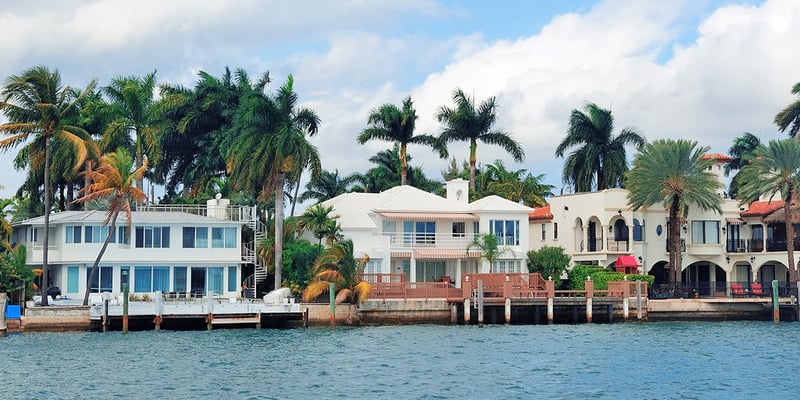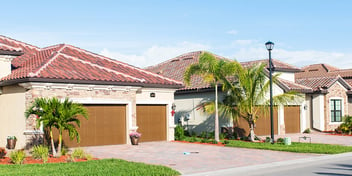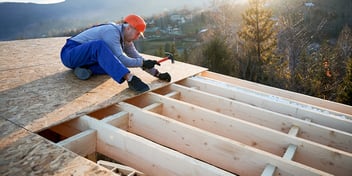- Home »
- Learningcenter »
- Roofing floridas salt corrosion
What Type of Roofing Holds Up Best to Florida's Salt Corrosion?

If you've wondered if the sea air might be damaging your roof bit by bit, living in Florida or any other coastal area has likely made you think about this more than once.
Around here, homeowners face the job of relentless salt corrosion. It really is a good idea to choose the right roofing material - and a smart choice could stop regular expensive repairs and help you get a tough roof that lasts a long time.
We'll look at the many kinds of roofing parts - looking at their pros and cons, especially for homes near the ocean. If you're planning to build a brand new home or when you're thinking about replacing your roof, knowing about these parts will help you make a smart decision!
Let's get started.
Why Florida Needs Strong Roofing
Living in Florida definitely presents some unique home maintenance challenges, doesn't it? When you think about the salty air, high humidity, and intense storms - the choice of roofing parts gets very well-known.
I have looked into all sorts of options, like aluminum and Galvalume steel, or stainless steel, copper, and zinc. Each has advantages against the inevitable salt corrosion, which is a big concern along the coast.

Aluminum is especially interesting because it's lightweight and naturally resists rust. Stainless steel is extremely tough and great for fighting corrosion. Copper improves over time by building a protective patina - zinc behaves in the same way.
In my research around Florida's coastlines I've seen how well these parts endure. Stainless steel to give you an example shows impressive durability even after multiple hurricane seasons. Zinc also has the ability to repair its own scratches and keep its appearance which is definitely a plus.
These parts might seem expensive initially, but they give you long-term savings by reducing the need for repairs or replacements. Knowing that your roof can stand up to whatever Florida's weather brings gives valuable reassurance. Investing in a tough and reliable roof is a sensible choice and a smart financial decision that can save you a lot of money over time.
Aluminum Roofing for Coastal Homes
After settling in Florida, I quickly learned that maintaining a house near the coast presents unique challenges - prompting me to prioritize picking the right roofing material. Aluminum roofing especially appealed to me because it holds up well under harsh coastal conditions. The resistance of aluminum to corrosion, aided by a naturally creating protective oxide layer, piqued my interest and seemed perfect for countering the salty, humid environment prevalent in the area.
My decision was also influenced by my desire to lessen my environmental change and reduce energy costs. Aluminum is great at reflecting sunlight and heat - letting my home stay cooler without excessive air conditioning use under the relentless Florida sun.

Aluminum roofs appeal to me because they need little upkeep. This is perfect since I like enjoying my weekends at the beach over doing house repairs. With right installation and regular maintenance to clear away debris an aluminum roof can easily last more than 50 years.
The available number of styles and colors in aluminum roofing was a big benefit. It made it easy for me to find an option that both fits my home's existing style and reflects my personal taste.
For those living near the coast, it's a good idea to focus on the specific installation needs prompted by strong winds and salty air. Making sure the roofing material is securely fastened and well-sealed is really important for optimal performance in such tough conditions.
So picking aluminum was an easy decision because of its strong performance in coastal settings. The combination of durability, energy efficiency and design flexibility combined with minimal maintenance meets all my criteria for a roofing material. Although the upfront cost is somewhat high, the long-term savings and added peace of mind are definitely worth it.
Benefits of Galvalume Steel Roofs
When you're near the coast in Florida deciding on the best roofing material can be difficult. I have faced this decision for myself and seen that Galvalume steel roofing is great as a top choice. This material deals well with the salty sea air that usually harms typical parts.
Galvalume combines aluminum and zinc - where aluminum acts as a strong barrier against corrosion and zinc gives extra protection to halt further damage. They protect against the weather - yet it's a good idea to install this type of roofing more than 1500 feet away from the shore. Close to the shore the salty air can harm the zinc causing the need for more repairs or replacements.

Homeowners like Galvalume for its durability and usefulness. It's also cheaper than many other high-end options.
For those concerned with aesthetics, Galvalume meets your needs without compromising functionality. Available in a number of colors and styles, it lets you align it with your home's exterior while still enjoying its valuable benefits.
I personally take comfort in knowing my investment in Galvalume steel roofing protects my home while reflecting my style and staying within budget. Its durability, cost-effectiveness, and design flexibility make it a perfect choice for facing Florida's coastal climate challenges. This choice will also make sure your roof is strong and even help with the appearance of your home, demonstrating the capabilities of modern roofing technology.
How Does Stainless Steel Perform?
Stainless steel is a popular one, especially because it resists rust and weathering so well. If you live in a similar environment, you might like the durability of stainless steel.
Stainless steel roofs are strong and also face environmental challenges. You should note, though, that they need a bit more maintenance, and their initial cost is higher. In my experience, the long lifespan of the roof offsets this initial expense, which makes it a smart option if you plan to hold onto your property for the long haul.

Among the stainless steel options, I like those with extra protective layers like zinc and tin alloys. These extra layers help with the roof's ability to defend against corrosion even further shielding it from the harsh coastal conditions.
It's smart to choose the right type of stainless steel for your roof. Adding protective alloys strengthens and improves the functionality of the roofing system. This decision really influences both the effectiveness of the roof and its long-term cost-efficiency.
Although stainless steel will need a bigger initial investment than parts like aluminum or galvanized steel, its strength in tough environments might justify the higher cost. I like to choose roofing parts that are strong and pretty much only need minimal maintenance, even though they are initially more expensive.
Looking at Copper Roofing Options
Now, we'll talk about copper roofing, which has earned a strong reputation for its durability in salty environments like those found along the Florida coastline. A unique part of copper is that it develops a protective patina over time - this layer shields the roof from further corrosion and also gives a special greenish vintage look that many people love. It's a bit like watching your roof gracefully turn into a more distinguished version of itself.
But, the beauty and functionality of copper come at a higher cost. When talking about roofing options with clients, I make sure to mention that even though copper roofs are more expensive at first, they give excellent long-term value. You get a tough roof that can protect your home for between 60 to 100 years with minimal maintenance, provided the installation is carried out perfectly to avoid future issues.

Now to give you an example: a house in Boca Raton had a copper roof installed nearly 30 years ago - even though enduring hurricanes and severe weather the roof stays in good shape which shows the durability and longevity of copper.
If you're fine with the upfront cost and are looking for a long-lasting answer with minimal maintenance, copper roofing is an excellent choice for coastal homes in Florida. Investing more now can prevent a lot of frustration and extra costs in the future. Picking tough parts like copper protects your home from the features but can also help with its look and possibly raise your property's value, which is valuable when you think about long-term planning.
Why Choose Zinc Roofing?
When talking about zinc roofing, I always mention its exceptional resistance to corrosion - this is really helpful in coastal areas like Florida, where salt air can damage parts. Zinc specifically reacts with carbon dioxide to form a protective layer that adheres to the metal - that blocks moisture and dirt, extending the roof's lifespan. No one enjoys dealing with rust, especially near the ocean, so this lower maintenance requirement is a real plus. It is also valuable to me that zinc is completely recyclable, which supports my efforts to make eco-friendly choices whenever possible.
Architects really like zinc, too, because of its flexibility. You can achieve all sorts of designs - quirky curved roofs or more difficult structures - without much trouble. I have seen a few homes with zinc roofs that stand out, and I have also developed an interesting patina that improves the roof's character as it ages.

But it's not perfect. When you think about the initial cost, living near the sea might also lead you to notice white streaks from salt deposits, which aren't always as nice to look at. When picking roofing parts, you need to think about your budget, the desired style, and expected durability. These factors are well-known in determining if zinc is the best option or if it is aluminum. It doesn't have the same design flexibility, but staying tough in coastal conditions might be a better choice.
Maintenance Tips for Metal Roofs
I've picked up a few practical tips throughout the years for keeping metal roofs in top shape, especially in salty environments like the Florida coast. One might think the durability of aluminum roofs against saltwater isn't threatened, but it's really smart to give them attention.
Starting with scheduling inspections - they prove really valuable. You ought to check your roof once in a while to catch minor issues like loose fasteners or initial rust signs before they worsen. My experience shows that doing these checks seasonally, especially after severe weather, can make a well-known difference.

Another useful tip is cleaning your metal roof. Ignoring salt buildup can speed up corrosion. I usually use a garden hose equipped with a spray nozzle for this job because it's an easy yet useful method to remove salt and keep the roof in top condition. Conduct a complete cleaning biennially. Remember to use a mild cleaner and avoid abrasive tools like wire brushes or high-pressure washers, which might hurt the roof's protective layer.
Also, applying a Polyvinylidene Fluoride (PVDF) coating improves the appearance of your roof and its resistance to salty air, sun exposure, and physical damage.
It's also very valuable to pay attention to the roof's edges and fasteners. These areas accumulate debris and water - this can cause rust and leaks if neglected. During my inspections I make sure these places are properly sealed and maintained.
Lastly, following local building codes, like applying a Sealed Roof Deck system prepares your roof to stand up to both corrosion and extreme weather. This is major in areas open to hurricanes. Keeping up with these standards can prevent many problems during the hurricane season.
Choose the Right Roofing Material for Your Home
Living near the ocean is great, isn't it? Along now with those unbeatable views and the soothing sound of waves, I also love taking brisk morning walks along the shore. But living here also comes with unique challenges, especially now when caring for your home. I've even picked up a few tips on roofing in these salty conditions that I'd love to talk about with you.
Through some research and hands-on experience, I've learned that certain roofing parts usually can't stand up to the relentless sea air. Metal roofing is a strong option to combat salt corrosion. Aluminum also stands out now as a top choice because of its lightweight and major resistance to the salty breeze. It's also pretty affordable, and with a PVDF coating, it performs even better against saltwater and sunlight.
If your home is a bit farther from the water's edge, stainless steel might be a good choice. However, it usually will need more room because of corrosion concerns. Zinc, although expensive, has unparalleled longevity and even develops a patina that improves its protective properties over time.

For those living in areas that frequently experience storms and rough weather - a typical coastal scenario - concrete tile roofing is capable of withstanding such conditions and is known for its durability against both saltwater corrosion and strong winds. Clay tile also maintains a solid reputation and proves to be a tough option for homes near the sea.
Have you thought about synthetic roofing parts? These innovative parts mimic the appearance of natural products like slate or wood shakes but are also tougher and lighter, a valuable benefit if your roofing structure has weight limitations.
In my strategy, I am also looking for a balance between performance and style. Consulting with local roofing experts who understand the regional weather and environmental challenges is extremely helpful. They give you advice to make sure you choose parts that fulfill your practical needs and match your style.
Protect The Roof Over Your Head
You likely want a material that is tough withstands salt air easily and keeps its look. You have options like aluminum copper or Galvalume steel - each giving unique advantages and disadvantages. My own experience involved a long process of figuring out how each type of roofing would affect the latest cost and also the potential increase in my home's value over time.

It may seem overwhelming, but talking to a roofing expert who is close to coastal climates can make a big difference. They have the skills to give you advice customized for your home. Surely, taking steps today to protect your home and avoid high future costs is worth it, right?
At Colony Roofers, our deep knowledge of roofing challenges comes from meaningful experience in Georgia, Florida, and Texas. We handle roofing projects for both businesses and homes, helping you make a good choice for your needs. Think about calling us for a free inspection - we are committed to professionalism and really care about your peace of mind. Get in touch today!
 Call (678) 365-3138
Call (678) 365-3138



